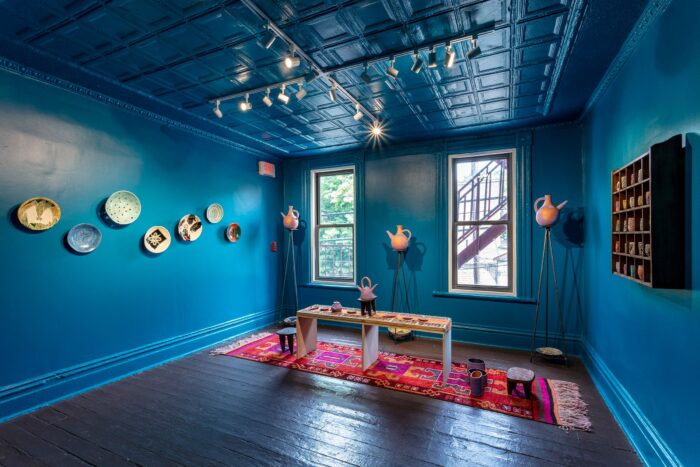
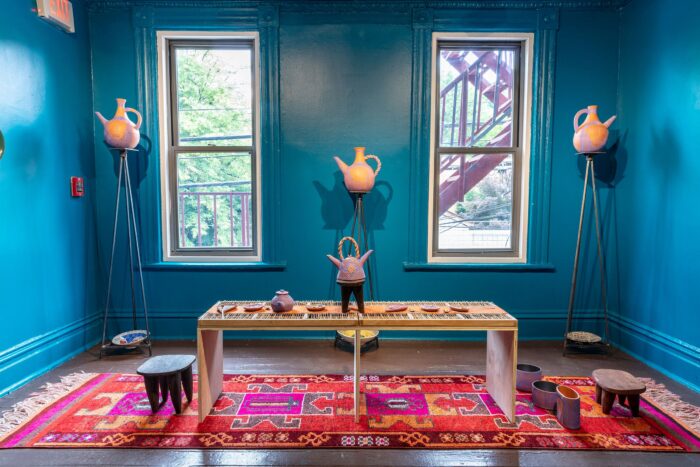
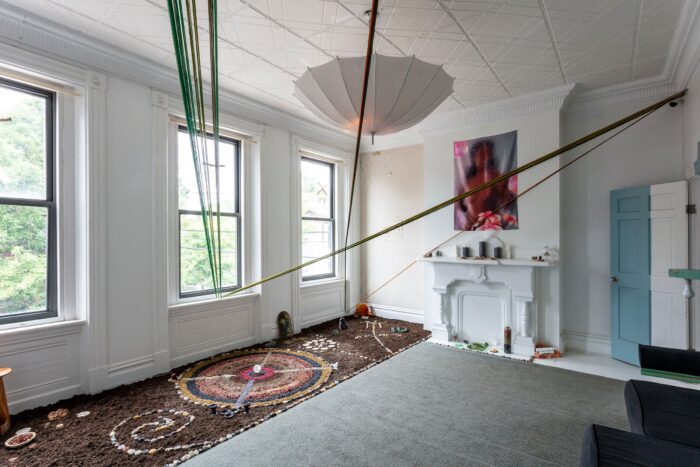
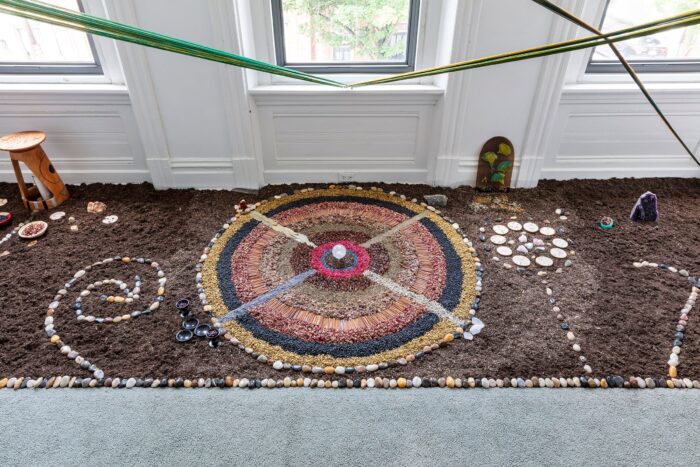
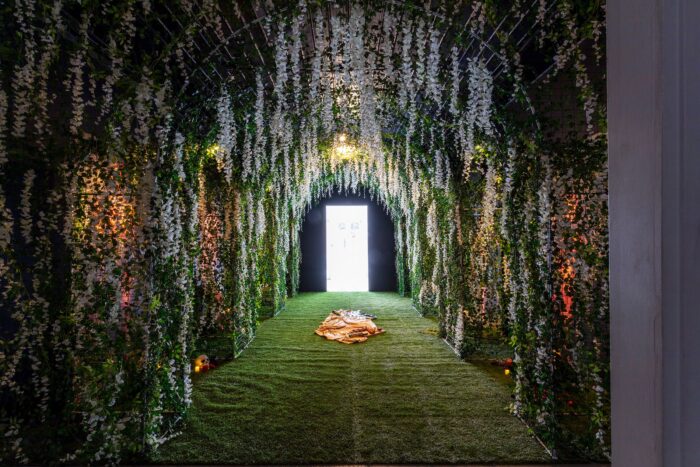
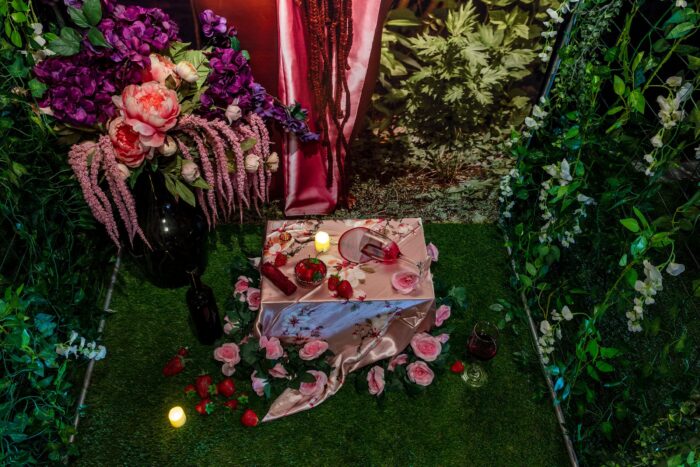
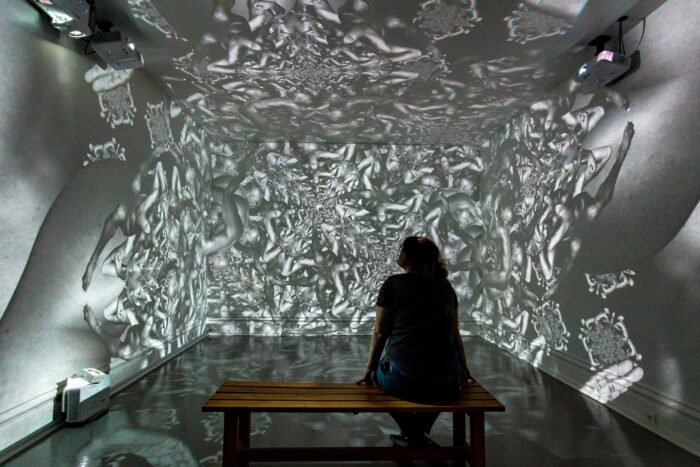
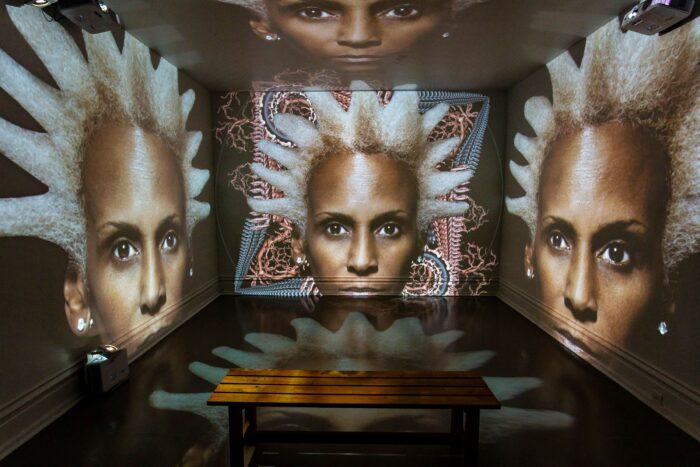
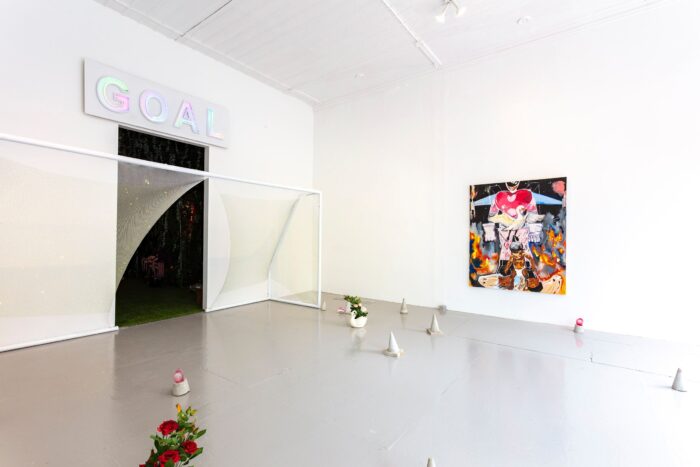
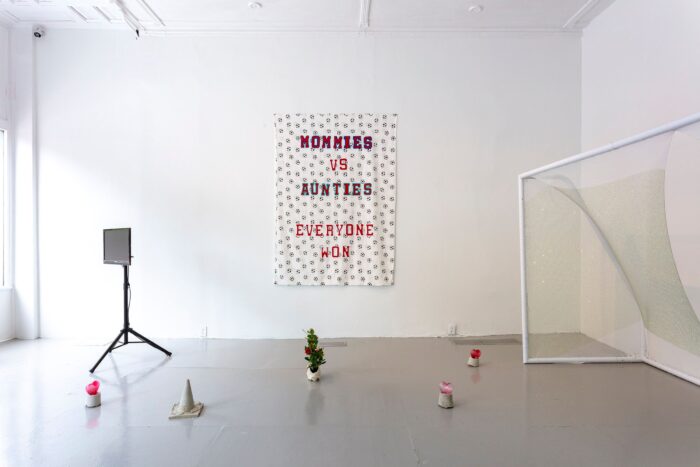
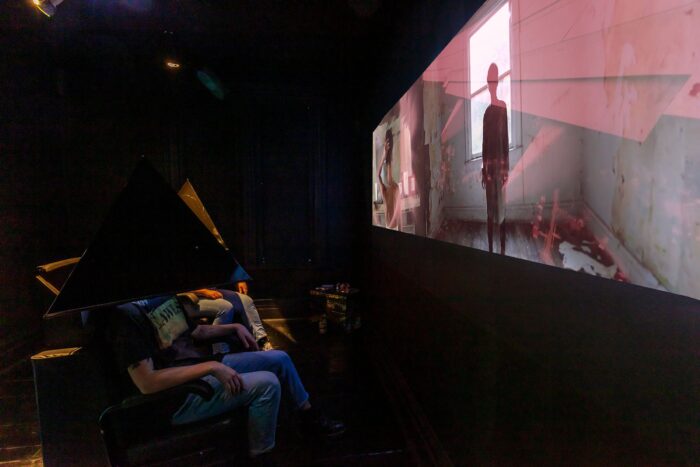
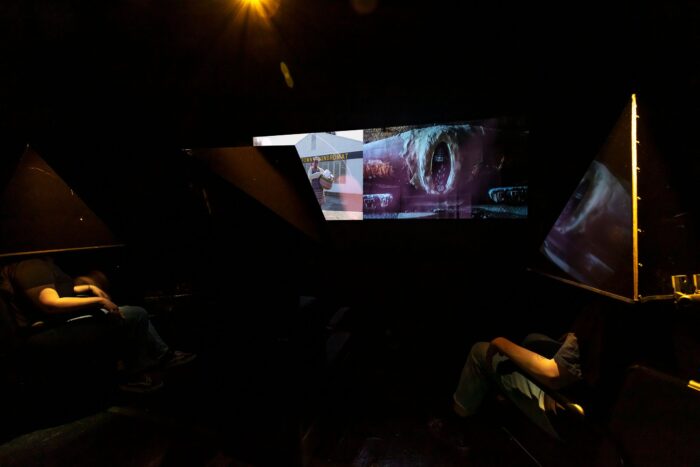
PITTSBURGH, PA (July 11, 2022) – The Mattress Factory, Sibyls Shrine and Pittsburgh-based artist and curator Jessica Gaynelle Moss present SHRINE, a tripartite program that uplifts and recognizes Black m/others, artists, creatives, and activists by honoring their creation of sacred and holy spaces as sites of resistance and liberation struggle.
SHRINE includes new immersive installations by six artists, including painter and assemblage artist Naomi Chambers, photographer and mixed media artist Renée Cox, artist and art educator Mary Martin, artisan and owner of a micro-enterprise LaKeisha Wolf, interdisciplinary artist and cultural producer Alisha B Wormsley, and visual artist sarah huny young. The installations will run from June 17, 2022 through December 30, 2022 at the Mattress Factory’s Monterey Annex.
These six artists bridge ancient practices with advanced technology, the spiritual and physical, and the artificial with the natural world. SHRINE provides some insight into each artist’s unique process and practice of resistance, self-love and preservation. Through sculpture, photography, film, painting, craft, ceramics, poetry, and new technologies, the Annex building has been transformed into a site of renewal, discovery and personal and collective healing.
Naomi Chambers’ Mommies Vs. Aunties is constructed in a playful fashion – precisely what the installation’s themes are rooted in, along with health, wellness and personal goal-building. A simulated soccer field adorned with concrete cones, a collection of black swans (which could be considered as one of the most graceful species of mothers) and a television stream of Chambers coaching other Black women – who identify as mothers and/or aunts – with life skills (passing = collaborating, juggling = balancing work with play) stand before an enormous end goal, inviting the viewer to work through their personal battles and celebrate their accomplishments in collaboration with the artist.
Viewers are invited to take a journey into the mind of artist Renée Cox with this multiple room installation. Deeply concerned with the racial discrepancies in society, Cox explores Black identity through photography, collage, video and other media, using the body to displace religious symbols from the white-centric paradigm. Soul Culture, Cox’s newest body of work, was developed with support from SoulRounded, an international, interdisciplinary team of Carnegie Mellon University graduate students. Working alongside Cox over a 14-week period, this collaborative team designed, developed and constructed these two new worlds using Cox’s Soul Culture imagery, projection mapping and other innovative, interactive tools and technologies.
Mary Martin’s A Constant Struggle for Reciprocity sees a blue-hued room as a calming backdrop for an active tea ceremony, full of various small objects and vessels made of clay, wood, fiber and glass. The artist describes the vessels as containers of spiritual and physical realms that have the ability to both give and receive. This reciprocity is demonstrated through the artist’s use of the double spouted vessel and the intertwined weaving technique. Martin weaves together distant ancestral connections and the natural world, as well as her west African roots with her African American ancestry. Martin’s functional pieces are intended for both informal and formal gatherings that bring humanity together, honor tradition, reclaim time and make space for reciprocal exchange despite our differences.
In LaKeisha Wolf’s How Deep Is Your Love, colorful cotton string takes up space, stretching from floor to ceiling as a beautiful reminder of the artist’s personal and spiritual growth. A portrait of the artist hangs above a mantel; her soft and vulnerable presence is felt by all who enter the space. The environment feels deeply personal and fully charged by the countless gemstones, crystals, salts and other natural elements that activate all of the senses. The centerpiece of the space is Wolf’s medicine wheel, made up of herbs and plant medicine that the artist harvested naturally from the earth. It is a strikingly physical representation of the love reflected back to the artist from Mother Earth on her journey as a Black woman.
Much of Alisha B Wormsley’s work is focused on creating what she has referred to as a “thriving radical Black dimension.” Remnants, Portals and Power: The Afterlife serves as a portal to a meditative void; a point of departure to a safe Black realm. This piece offers a glimpse into the artist’s deep investigation into themes of family dreamscapes, sister and m/other-hood, and science fiction. Before entering the space, the audience is greeted with the haunting score of opera singer Li Harris’ “Pythia Is A Black Girl’s Name” flowing throughout the rest of the Annex. Remnants, Portals and Power: The Afterlife includes an altar adorned with candles, offerings, crystals and personal objects, a two-channel wall projection and three dryer salon chairs with pyramid helmets that feature a series of excerpts from Wormsley’s “children of NAN” archive.
sarah huny young’s 7 is a lush underground sanctuary blanketed with vines of ivy, eucalyptus, and wisteria. This grotto houses photographs of six towering Black goddesses who live harmoniously in a space where cultural lines are nonexistent. The goddesses represented here – Oshun, Mami Wati, Aranyani, Venus, Pomba Gira and Lilith – are all tied into motherhood, fertility, vengeance and rage. And “7”, highly symbolic in numerology and multiple cultures, religions, antiquities, and practices, is ultimately a reminder, as the artist says, “to every Black woman who steps in this space that self-preservation begins with a worship within one’s self and in one’s likeness.”
Rather than asking the community to come to art, curator Jessica Gaynelle Moss investigated the result of bringing art to the community with two additional programs: SANCTUARY and ALTAR. SANCTUARY, a free one-day public outdoor block-party-style event, was held on June 17th from 6-8pm to honor over ten local entrepreneurs and small businesses. Featured artists and vendors included Schereéya, Marietta Altenor, Dail Chambers, Nikki Delice, Chere Gordon, Desa Kishar, and Tiara LaShawna. ALTAR, a free experimental satellite gallery (located across 27,000 digital display boards throughout the city of Pittsburgh), engages with the public outside of the formal exhibition space by embedding art directly into various Pittsburgh neighborhoods. ALTAR features the work of artists Tara Fay Coleman, Olivia Guterson, Anqwenique Kinsel, Tsedaye Makonnen and janera solomon, and runs through the end of August 2022.
SHRINE also includes written contributions by poet Camille Posey, writer janera solomon and editor Gwendolyn Mitchell. SHRINE features Public Programs led by artists Dail Chambers and Alecia Dawn Young. The exhibition visual concept and catalog was designed by artist and Mattress Factory Designer, Cori Robinson.
SHRINE is presented in partnership between the Mattress Factory and Sibyls Shrine, an arts collective and residency program rooted in the radical care, rest and support for Black women, womxn, trans women, and femmes who are m/others and identify as artists, creatives, and/or activists.
ABOUT THE MATTRESS FACTORY
The Mattress Factory, founded in 1977, is a site-specific contemporary art museum with a mission to say “Yes” to artists. Located in Pittsburgh’s historic Northside, just minutes from Downtown Pittsburgh, the Mattress Factory hosts artists from around the world and around the corner who live and work at the Museum as they create site-specific installation art that transforms spaces in our two historic row homes, converted mattress warehouse and surrounding neighborhood. In addition to revolving installations created by artists-in-residence, the Mattress Factory also is home to installations by Greer Lankton, James Turrell, Winifred Lutz, Yayoi Kusama and more. For more information, call 412-231-3169 or visit mattress.org.
ABOUT THE ARTISTS
Naomi Chambers is a painter and sculptor born in Pittsburgh in 1987. She graduated with a double degree from the University of Pittsburgh majoring in Studio Arts and Marketing in 2009. In 2017, she and her husband worked with a collective of artists to open FlowerHouse, a community art studio and creative space in Wilkinsburg where they offer workshops for the predominantly Black community. In 2018, she had her first solo exhibition Communal Futures at an arts institution, August Wilson Center: African American Cultural Center. She is currently Community Liaison with Alisha Wormsley’s Sibyls Shrine, a residency for creative mamas.
https://www.caapp.pitt.edu/
Renée Cox received her BA from Syracuse University and MFA from the School of Visual Arts. Upon graduating, she participated in the Whitney Museum of American Art, Independent Study Program. Her work has since been included in solo and group exhibitions at prominent institutions including the Tate Liverpool, the New Museum of Contemporary Art, Brooklyn Museum, Harvard University, British Museum at Yale University, the Whitney Museum of American Art, Columbia Museum of Art and “Posing Modernity: The Black Model from Manet to Matisse to Today” at Columbia University. She has received several professional accolades including the Artists Fellowship Award from the New York Foundations for the Arts, The MacDowell Colony, and the Aaron Matalon Award, The National Gallery of Jamaica. Ms. Cox is presently an associate professor at Columbia University and has served as a critic at Yale College of Art, New York University and Parsons School of Design. Renée’s work and process have been officially immortalized in Smithsonian’s Archive of American Art.
https://www.reneecox.org/
Mary Martin (American, b. 1970) is an African American visual artist and educator from Pittsburgh, PA. After earning bachelor’s degrees in both Architecture and Fine Arts from the Rhode Island School of Design, Martin’s artistic practices expanded to include ceramics, collage, glass, metals, and printmaking mediums. Martin’s art forms consist of both functional and sculptural works that incorporate intricate carvings and linear patterning that adorn the vessel surface.
http://mary-martin-9koq.
LaKeisha Wolf is a self-taught artisan, whose insightful skills were honed in the embrace of the Africana cultural community in Pittsburgh, PA. She is the founder of a micro-enterprise centered on making and wellness. This multidisciplinary creator has grown her competency working to uplift and center her own healing, as well as that of Black women and the broader Black community, using nature, arts and culture. Beading and wire-wrapping gemstone jewelry is what initiated her artistic practice, which includes making in a variety of forms, all of which are anchored by a desire to reflect the highest forms of self love. LaKeisha leads through the lens of creativity, shared cultural values and community, working with artists and organizers to develop place-making strategies, models of equity for community resources, as well as local and global partnerships rooted in the values of fair trade entrepreneurship and cooperation. Wolf’s resources are purpose-centered relationships, stones and natural elements, symbols and affirmations.
https://www.ujamaacollective.
Alisha B Wormsley (Pittsburgh, PA, USA) is an interdisciplinary artist and cultural producer. Her work contributes to the imagining of the future of arts, science, and technology through the black womxn lens, challenging contemporary views of modern American life through whichever medium she feels is the best form of expression, creating an object, a sculpture, a billboard, performance, or film and thrives in collaboration. Her work has been exhibited widely. Most recently, the Oakland Museum, VCUArts Qatar, Speed Museum, Artpace, Times Square Arts and the Carnegie Museum of Art. Over the last few years, Wormsley has designed several public art initiatives including Streaming Space, a 24 foot pyramid with video and sound installed in Pittsburgh’s downtown and several park designs. Wormsley created a public program out of her work, There Are Black People In the Future, which gives mini-grants to open up discourse around displacement and gentrification and was also awarded a fellowship with Monument Lab and the Goethe Institute. In 2020, Wormsley launched an art residency for Black creative mothers called Sibyls Shrine, which has received two years of support from the Heinz Endowments. Wormsley’s newest project, D.R.E.A.M. A Way to Afram, with longtime collaborator Li Harris, was awarded a 2022 Guggenheim Fellowship. Awardee of the Sundance Interdisciplinary grant, the Carol Brown Achievement award and among others. Wormsley has an MFA in Film and Video from Bard College and currently is a Presidential Postdoctoral Research Fellow at Carnegie Mellon University.
https://alishabwormsley.com/
Sarah Huny Young is an award-winning photographer and visual artist primarily documenting and exalting Black womanhood and queer communities through portraiture and video. Framing her subjects as muses, she often shoots on-location in personal, intimate spaces and natural settings. Her work has been featured in The New York Times, The Washington Post, ESPN, New York Magazine, Pittsburgh City Paper, and more.
https://shooter.hunyyoung.com/
ABOUT THE CURATOR
Jessica Gaynelle Moss (b.1987) is an artist, custodian of Black art, and creator of platforms and spaces that invest in the historically excluded. Melding her dedication to making art, supporting artists and developing more equitable and just policies, Jessica’s creative practice and projects transcend any one medium, discipline or field, coalescing fine art with real estate development, institution-building and philanthropy. Beyond that she runs her own arts consultancy, curates exhibitions and performances, regularly leads art talks and studio critiques, serves on the leadership boards of various cultural entities, and is a frequent speaker on panels on the subjects of artist support, advocacy and stewardship. Jessica received a bachelors in Fine Art from Carnegie Mellon University in 2009; a masters in Arts Administration, Policy and Management from the School of the Art Institute of Chicago in 2015; and graduated from the University of Pittsburgh School of Law in 2018.
www.jesseplane.com


